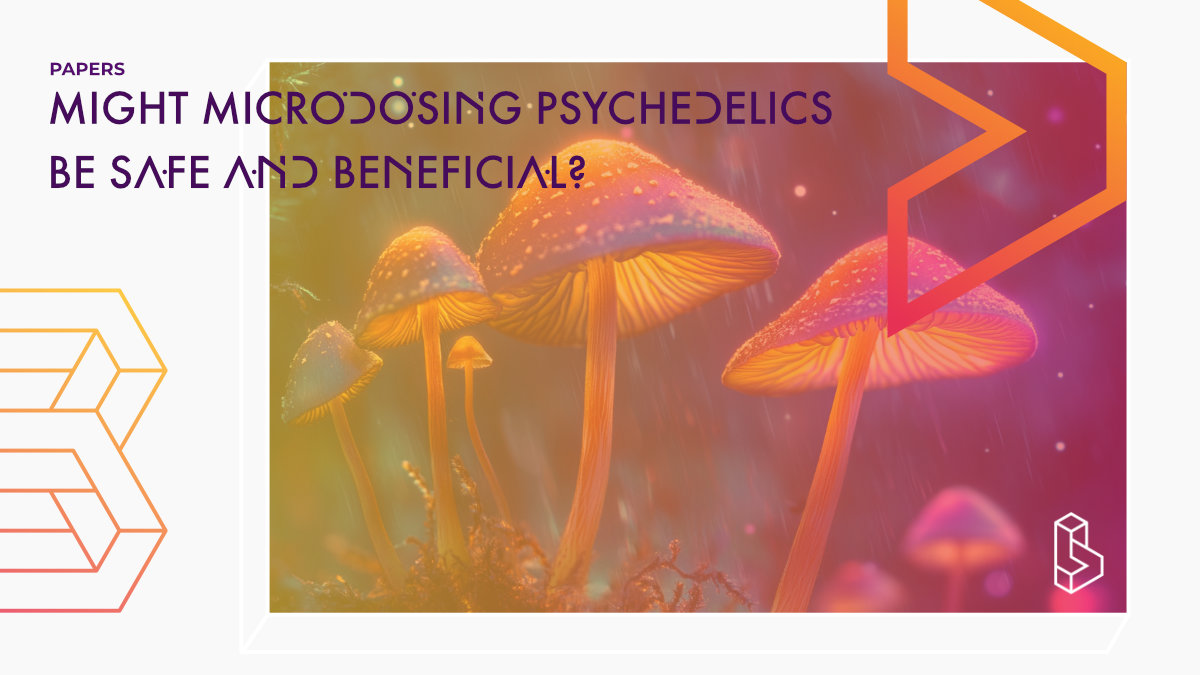This diary study (n>100) investigates the “safe and beneficial” use of psychedelic microdosing (e.g. 10μg LSD) to improve positive moods by evaluating positive and negative emotional states using the PANAS checklist and written reports. The study showed that microdosers perceived improved health habits, increased energy, and improved work effectiveness. Furthermore, smaller samples demonstrated alleviation of symptoms in migraine headaches, traumatic brain injury, pre-menstrual syndromes (PMS), shingles, and other such conditions that have not been previously associated with psychedelic use.
Abstract of Might Microdosing Psychedelics Be Safe and Beneficial?
“Albert Hofmann suggested that low doses of LSD might be an appropriate alternative to Ritalin. Following this possibility, a systematic exploration of the effects of “microdoses,” comprising hundreds of lengthy descriptive reports, was undertaken. Based on these reports, using a psychedelic in the microdose range (10 micrograms) every three days was determined to be safe across a wide variety of individuals and conditions. Over 18 months, more than a thousand individuals from 59 countries did a daily evaluation of negative and positive emotional state using the PANAS checklist plus written reports for between one week and four months. Participant reports suggested that spaced but repeated microdoses were followed by improvements in negative moods, especially depression, and increases in positive moods. Increased energy, improved work effectiveness, and improved health habits were observed in clinical and non-clinical populations. Smaller samples described alleviation of symptoms in migraine headaches, pre-menstrual syndromes, traumatic brain injury, shingles, and other conditions not previously associated with psychedelic use.“
Authors: James Fadiman & Sophia Korb
Summary of Might Microdosing Psychedelics Be Safe and Beneficial?
The researchers begin by explaining that microdosing involves taking very small doses of psychedelics like LSD or psilocybin mushrooms – about 1/10 to 1/20 of a typical recreational dose. At these low doses, microdosing does not produce the classic psychedelic effects like visual distortions. The authors define a microdose behaviorally as: “Feeling productive, able to focus on what I choose, enjoying relationships, good energy, and not recalling that I took anything.”
The article reviews findings from initial exploratory reports, structured explorations, and planned follow-up studies on microdosing. The authors note that despite anecdotal use by indigenous peoples, the effects of such low doses had not been systematically studied until recently.
Initial Microdose Exploration
Find this paper
Might Microdosing Psychedelics Be Safe and Beneficial? An Initial Exploration
https://doi.org/10.1080/02791072.2019.1593561
Open Access | Google Scholar | Backup | 🕊
Cite this paper (APA)
Fadiman, J., & Korb, S. (2019). Might microdosing psychedelics be safe and beneficial? An initial exploration. Journal of psychoactive drugs, 51(2), 118-122.
Study details
Compounds studied
LSD
Psilocybin
Topics studied
Microdosing
Creativity
Traumatic Brain Injury
Study characteristics
Survey
Participants
100
Humans
Authors
Authors associated with this publication with profiles on Blossom
James FadimanJames Fadiman as a psychologist and writer. He has written the influential book The Psychedelics Explorer's Guide. He co-founded the Institute of Transpersonal Psychology, which later became Sofia University.

